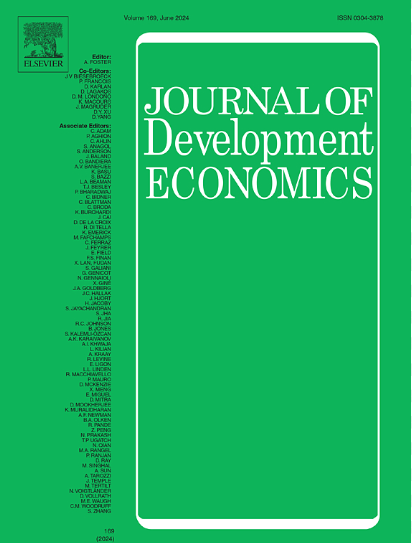Anti-corruption shocks, political incentives, and regional economic development in a developmental state
IF 4.6
1区 经济学
Q1 ECONOMICS
引用次数: 0
Abstract
This study examines the impact of anti-corruption campaigns on regional economic development in a developmental state with weak market-supporting institutions. By leveraging staggered investigations of city leaders’ political patrons amid the recent corruption crackdown in China, we find that cities led by officials connected to investigated high-ranking officials experience a notable decline in economic performance. This decline is most plausibly attributed to diminished corruption-induced efforts by local officials in various government-led economic activities, including land sales, government procurement, and public infrastructure investment. However, we find that local governments place greater emphasis on environmental protection, and several welfare indicators, including air quality, improve significantly following the shock. We rule out alternative explanations such as unfavorable market responses or decreased support from higher-level governments. Further analysis reveals that local leaders achieving superior economic performance after their patrons’ downfall would face worse career prospects. Our findings highlight that China’s anti-corruption campaign has helped transform the development model of local governments from a corruption-driven, growth-oriented one to one centered on high-quality development with a stronger focus on welfare.
发展中国家的反腐冲击、政治激励与区域经济发展
本研究考察了在一个市场支持制度薄弱的发展中国家,反腐运动对区域经济发展的影响。在中国最近的反腐行动中,通过对城市领导人政治庇护人的交错调查,我们发现,由与被调查的高级官员有联系的官员领导的城市,其经济表现明显下降。这种下降最合理的原因是,地方官员在各种政府主导的经济活动中,包括土地销售、政府采购和公共基础设施投资,腐败导致的努力减少了。然而,我们发现地方政府更加重视环境保护,包括空气质量在内的一些福利指标在冲击后显著改善。我们排除了其他解释,如不利的市场反应或上级政府的支持减少。进一步的分析表明,地方领导人在其赞助人下台后取得了更好的经济表现,其职业前景将会更糟。我们的研究结果强调,中国的反腐运动帮助地方政府的发展模式从腐败驱动、增长导向转变为以高质量发展为中心、更加注重福利的发展模式。
本文章由计算机程序翻译,如有差异,请以英文原文为准。
求助全文
约1分钟内获得全文
求助全文
来源期刊

Journal of Development Economics
ECONOMICS-
CiteScore
8.30
自引率
4.00%
发文量
126
审稿时长
72 days
期刊介绍:
The Journal of Development Economics publishes papers relating to all aspects of economic development - from immediate policy concerns to structural problems of underdevelopment. The emphasis is on quantitative or analytical work, which is relevant as well as intellectually stimulating.
 求助内容:
求助内容: 应助结果提醒方式:
应助结果提醒方式:


